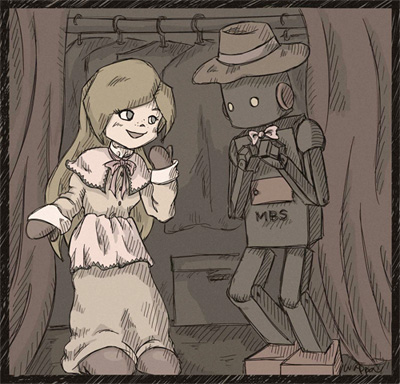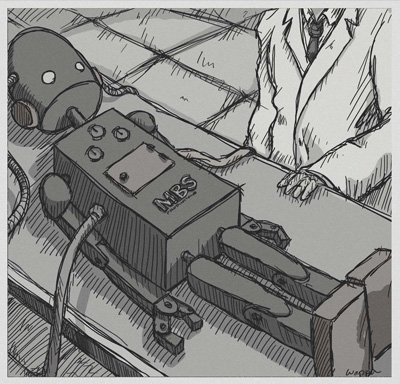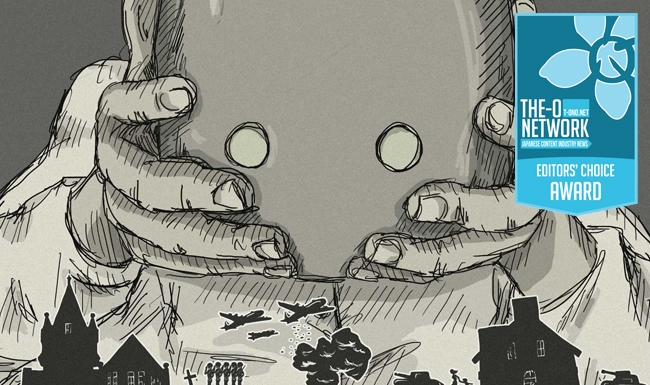What makes us human? Is it our emotions or is it something more? These deep-seated ideological questions have been proposed and grappled with time and time again by philosophers since the dawn of man as there's not just one single homogeneous answer. Everyone has to find his or her own happiness in life and this simple idea is what makes Nobou Uematsu's short story, Blik-0 1946 so effective. Although it starts off with the contrite "monster of the week" trope, seemingly borrowing heavy motifs from Frankenstein and Mega Man, it quickly blossoms into a sweet and intimate fairy tale about a robot who struggles with his identity and humanity; all the while staying entertaining without ever feeling overly pretentious.
 Set sometime before the end of World War II in Germany, Dr. Mabuse, an A.I. specialist, decides to run away to a secluded village in the countryside to continue his work on his tin robot Blik-0. Soon after his creation, Blik-0, whose brains and circuitry were originally designed as weapons of war, learns to understand basic human emotions and values such as love, learning and the pursuit of happiness. All in an imperfect society that would soon rather take advantage him than treat him as an equal. It's this careful examination of his personal crisis that crafts Blik-0 as an easily identifiable protagonist that resonates across a wide amount of demographics, despite the story's strong science-fiction roots and storybook telling techniques.
Set sometime before the end of World War II in Germany, Dr. Mabuse, an A.I. specialist, decides to run away to a secluded village in the countryside to continue his work on his tin robot Blik-0. Soon after his creation, Blik-0, whose brains and circuitry were originally designed as weapons of war, learns to understand basic human emotions and values such as love, learning and the pursuit of happiness. All in an imperfect society that would soon rather take advantage him than treat him as an equal. It's this careful examination of his personal crisis that crafts Blik-0 as an easily identifiable protagonist that resonates across a wide amount of demographics, despite the story's strong science-fiction roots and storybook telling techniques.
 While this is Nobou Uematsu's first published story, there are still plenty of genuinely heartfelt moments whose poignancy are emphasized by the well-written prose, evocative score, and beautiful illustrations from Hiroki Ogawa. In one strikingly memorable scene, Blik-0 discovers that with all the joys of living comes heartbreaking pain. The song "Ah But Why" reflects Blik-0's inner turmoil as he struggles with loss. Lyrics such as, "My mind is my own, I think therefore it aches; My heart is my own, I love therefore it breaks" helps draw Blik-0 as a real entity in the minds of the reader as the narrative switches from third-person into first-person perspective. What's particularly interesting is Uematsu's that the lyrics are spoken through the use of a musical synthesizer which adds an extra emotional layer to the piece.
While this is Nobou Uematsu's first published story, there are still plenty of genuinely heartfelt moments whose poignancy are emphasized by the well-written prose, evocative score, and beautiful illustrations from Hiroki Ogawa. In one strikingly memorable scene, Blik-0 discovers that with all the joys of living comes heartbreaking pain. The song "Ah But Why" reflects Blik-0's inner turmoil as he struggles with loss. Lyrics such as, "My mind is my own, I think therefore it aches; My heart is my own, I love therefore it breaks" helps draw Blik-0 as a real entity in the minds of the reader as the narrative switches from third-person into first-person perspective. What's particularly interesting is Uematsu's that the lyrics are spoken through the use of a musical synthesizer which adds an extra emotional layer to the piece.
As expected of famed video game composer Nobou Uematsu (Final Fantasy, Lost Odyssey), all three beautifully crafted synthesized compositions that accompanies the short story are an audible treat and are currently available on iTunes for $2.97.
Although the story is a tad bit on the short side, at about twenty-four pages, Blik-0 1946 is still a joy to read and comes in as a great recommendation for anyone looking for a poignant tale about humanity and what makes us human.
![]()
What I Loved:
-Bilk-0 is well crafted as an easy to root for protagonist.
-Well written prose, a visceral score and gorgeous illustrations adds extra layers of complexity to the simple story.
What I Hated:
-A tad bit on the short side.
Disclosure: A review copy was provided by the distributor.

